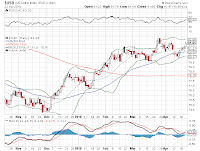Greece's fiscal problems are weighing down the rest of the EU as fund managers ponder the potential end of monetary union.
http://www.bloomberg.com/apps/news?pid=20601087&sid=avEnrIJe4dI8&pos=2
Dedicated to presenting finance and economics news in plain English.

Greece's fiscal problems are weighing down the rest of the EU as fund managers ponder the potential end of monetary union.
http://www.bloomberg.com/apps/news?pid=20601087&sid=avEnrIJe4dI8&pos=2

 The dollar has also moved back above its 50 day MA.
The dollar has also moved back above its 50 day MA.Clinton also said that Republicans who controlled Congress would have stopped him from trying to regulate derivatives. “I wish I had been caught trying,” Clinton said. “I mean, that was a mistake I made.”
Affordable housing in China is a joke. Instead, the real estate market - along with the stock market - has turned into a giant casino. Fund flows from Chinese investors are contributing to the bubble because of strict capital controls that remain on where, what, when, and how (regular) native Chinese can spend their funds. Thus, this news is encouraging - even if it appears to be yet another round of mere talk instead of more substantive action.
Surging Prices
Property prices in 70 major cities surged 11.7 percent in March from a year earlier, the most since records began in 2005, government data showed last week.
In an April 15 statement after the release of first-quarter numbers for gross domestic product, the State Council said that local governments have failed to control speculation. Besides limiting the risk of price bubbles, policy makers want to keep housing affordable.
"We seem to be at a crossroads with options these days. On one hand, mostI slightly disagree with the author to some extent and believe that sometimes it makes sense to lay out some debits at these low volatility points. He is championing an iron condor strategy - something that can be very expensive for traders to take on.
options have an implied volatility near 52-week lows. Who would want to sell
options when they are this cheap?
On the other hand, the only important aspect of an option's volatility is whether it is too high or too cheap relative to the volatility of the underlying instrument itself going forward. Spreads tend to work best as they have the defined risk and defined reward. You can make the same risk case with a straight buy though. All things considered, I prefer taking in credit."